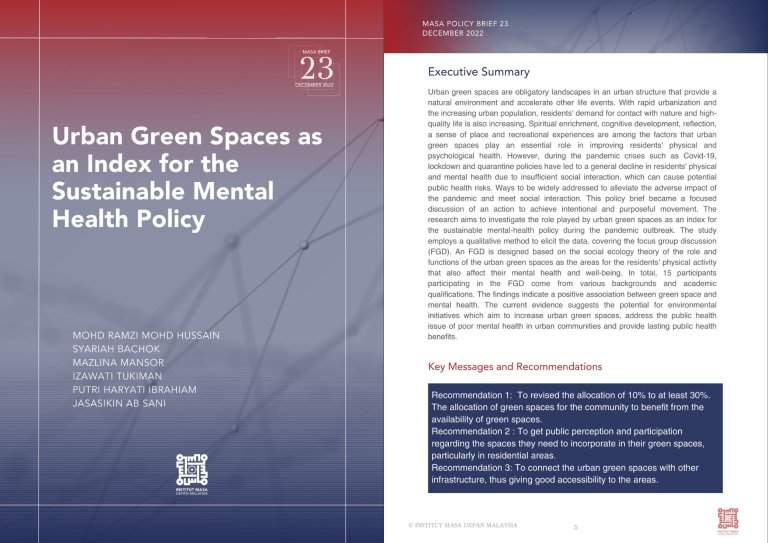Urban green spaces are obligatory landscapes in an urban structure that provide a natural environment and accelerate other life events. With rapid urbanization and the increasing urban population, residents’ demand for contact with nature and high-quality life is also increasing. Spiritual enrichment, cognitive development, reflection, a sense of place and recreational experiences are among the factors that urban green spaces play an essential role in improving residents’ physical and psychological health. However, during the pandemic crises such as Covid-19, lockdown and quarantine policies have led to a general decline in residents’ physical and mental health due to insufficient social interaction, which can cause potential public health risks. Ways to be widely addressed to alleviate the adverse impact of the pandemic and meet social interaction. This policy brief became a focused discussion of an action to achieve intentional and purposeful movement. The research aims to investigate the role played by urban green spaces as an index for the sustainable mental-health policy during the pandemic outbreak. The study employs a qualitative method to elicit the data, covering the focus group discussion (FGD). An FGD is designed based on the social ecology theory of the role and functions of the urban green spaces as the areas for the residents’ physical activity that also affect their mental health and well-being. In total, 15 participants participating in the FGD come from various backgrounds and academic qualifications. The findings indicate a positive association between green space and mental health. The current evidence suggests the potential for environmental initiatives which aim to increase urban green spaces, address the public health issue of poor mental health in urban communities and provide lasting public health benefits.
#23 : Urban Green Spaces as an Index for the Sustainable Mental Health Policy
- Laporan Dasar, Program Pembangunan Dasar MASA
Kongsi Artikel
Artikel Lain
Artikel
Oleh Muhammad Iman Khidir Tarmidzi Dalam struktur pentadbiran Malaysia, pihak berkuasa tempatan (PBT)...
Artikel
Oleh Solahuddiin Ismail Mina Jangka hayat ketika lahir adalah satu anggaran purata umur...
Artikel
Oleh Mohamad Fauzi Ahmad Meskipun ekonomi Malaysia bergantung pada permintaan domestik, sumbangan bumiputera...
Artikel
Oleh Muhammad Iman Khidir Tarmidzi Siswazah muda dalam dekad kebelakangan ini, terperangkap dalam...
Artikel
Oleh Muhammad Iman Khidir Tarmidzi Dalam struktur pentadbiran Malaysia, pihak berkuasa tempatan (PBT)...
Artikel
Oleh Solahuddiin Ismail Mina Jangka hayat ketika lahir adalah satu anggaran purata umur...
Artikel
Oleh Mohamad Fauzi Ahmad Meskipun ekonomi Malaysia bergantung pada permintaan domestik, sumbangan bumiputera...
Artikel
Oleh Muhammad Iman Khidir Tarmidzi Siswazah muda dalam dekad kebelakangan ini, terperangkap dalam...
Artikel
Oleh Muhammad Iman Khidir Tarmidzi Dalam struktur pentadbiran Malaysia, pihak berkuasa tempatan (PBT)...




